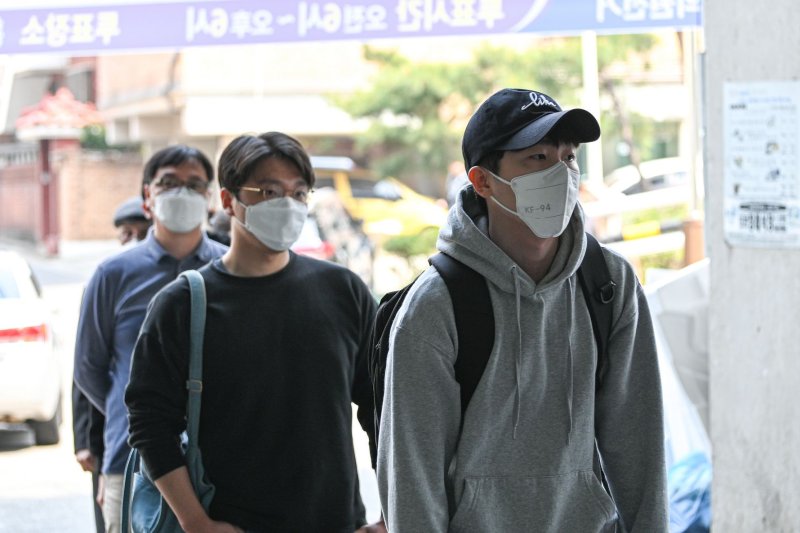South Korean voters in their 20s and 30s are "relatively free" from the ideological conflicts of older generations, according to South Korean political scientist Jang Seung-jin. File Photo by Thomas Maresca/UPI |
License Photo
July 28 (UPI) -- Millennial generation and "Gen Z" South Koreans struggling to find their footing in an uncertain economy could be turning more to the nation's political parties for answers.
The election of 36-year-old politician Lee Jun-seok to the leadership of the main opposition People Power Party sets the spotlight on younger voters.
South Koreans under age 30 face a jobless rate that has been in the double digits for years, according to Seoul's National Statistical Office. Thirty-something South Koreans, meanwhile, are increasingly dropping out of the job market -- though the data could reflect the economic fallout from COVID-19.
Shin In-kyu, 35, a lawyer in private practice in Seoul, told UPI that his generation feels lost after years of frustration.
President Moon Jae-in, a progressive, had pledged during his 2017 campaign to reduce unemployment and build job security. But "getting hired is difficult and jobs are scarce" at a time when "Korea's growth momentum has disappeared," Shin said.
South Korea's mature postindustrial economy already was struggling, but the policies of the Moon administration made things worse, the lawyer said.
Economic policies
Last year, the president vowed to rein in skyrocketing home prices and approved heavier taxes on multiple homeowners, hoping the policy would increase supply. The plan backfired and only led to panic buying in the market and higher prices.
The administration "crushed the dreams of young people" left with no choice but to postpone plans, including marriage and family, Shin said.
Dissatisfied with domestic politics, Shin applied to become a spokesman for the main opposition party. Nearly 150 South Koreans from all walks of life, including a high school student, had applied through a competitive interview process.
The 16 semifinalists endured several rounds of public debates that streamed live on YouTube. Shin, who reached the final round, was selected to be a spokesman for six months, along with three other finalists.
The selection process, branded "Debate Battle," was the brainchild of Harvard-educated Lee, a newcomer to the national stage. People watching the debates also could cast votes for the candidates.
Shin said the tough competitive process was defined by "fairness," a buzzword that has gained traction among younger South Koreans disillusioned with recent political scandals, including allegations of fake academic credentials involving the daughter of ex-Justice Minister Cho Kuk, a former Moon aide.
While South Korean media has suggested men in their 20s and 30s are turning out to support Korea's traditional conservatives, Jang Seung-jin, a professor of political science at Kookmin University in Seoul, said the reports are not necessarily conclusive.
Jang told UPI that while exit polls conducted by South Korean broadcasters indicate more than 70% of South Korean men in their 20s voted for conservative candidate Oh Se-hoon in a Seoul mayoral by-election in April, the exit poll does not reflect early voting results.
"However, it can be said that voters in their 20s and 30s are relatively free from the ideological conflicts of traditional Korean politics, compared to voters in their 50s or older," Jang said.
"Many people [also] agree that a large part of the reason young voters are critical of the current administration is that they are not achieving economic results, including in the area of employment."
Uncertain futures
For South Koreans who have witnessed their country transition from authoritarian rule to democracy, the millennial generation and Gen Z are too quick to change political stripes if they are unhappy with their leaders.
Kim Hyo-yong, chief executive of Vision Helper, a human resource management provider in Seoul, said the South Korean office is changing, as millennials and Gen Z have joined the workforce.
Younger Koreans can be less dedicated to their corporate employers than older employees, who are more accustomed to following orders and spending long hours in the office, Kim said.
Younger employees also are more about work-life balance and learning new skills that could help them cope with potential job changes or job loss, Kim said.
"For the millennial generation and Gen Z, the stable workplace concept has disappeared," Kim told UPI, referring to the end of a lifetime employment guarantee that was in place for previous generations.
Younger Koreans who cope with uncertainty in the workplace also could be less likely to adhere to one political party, in contrast to Koreans in their 40s or 50s, Kim said.
Millennial South Koreans turned out in droves to support the 2016-17 "candlelight protests" against former President Park Geun-hye, a conservative, who later was impeached for enabling corruption at the highest level of government. Those same individuals could be rethinking their political support for Moon.
"The generation in their 40s and 50s, they don't change a lot," Kim said. "They stick to their guns. They're a little stronger."















